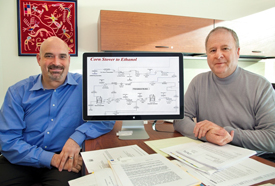A Wiki for the Biofuels Research Community

Blake Simmons (left) and Harvey Blanch of the Joint BioEnergy Institute led the development of a technoeconomic model for optimizing biorefinery operations. Image cedit: Roy Kaltschmidt, Berkeley Lab Public Affairs
Researchers at the U.S. Department of Energy’s Joint BioEnergy Institute (JBEI) have created a technoeconomic model that should help accelerate the development of a next generation of clean, green biofuels that can compete with gasoline in economics and well as performance. This on-line, wiki-based model enables researchers to pursue the most promising strategies for cost-efficient biorefinery operations by simulating such critical factors as production costs and energy balances under different processing scenarios.
“The high production cost of biofuels has been the main factor limiting their widespread adoption,” says JBEI’s Daniel Klein-Marcuschamer. “We felt that a model of the biorefinery operation that was open, transparent about the assumptions it uses, and updatable by the community of users could aid in guiding research in the direction where it is most likely to reduce the production cost of biofuels.” (more…)
